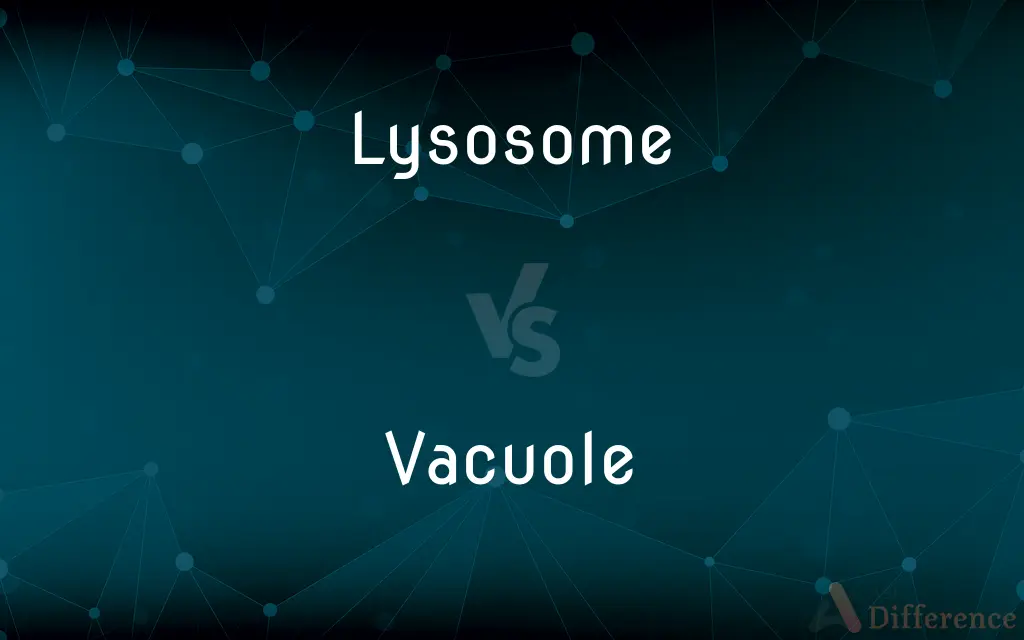Lysosome vs. Vacuole — What's the Difference?
Edited by Tayyaba Rehman — By Fiza Rafique — Updated on September 22, 2023
Lysosomes are membrane-bound organelles containing enzymes that break down waste materials and cellular debris. Vacuoles are also membrane-bound but mainly serve as storage units for nutrients, waste, and other substances.

Difference Between Lysosome and Vacuole
Table of Contents
ADVERTISEMENT
Key Differences
Lysosomes are specialized vesicles within cells that contain enzymes for breaking down waste and foreign material. Vacuoles, on the other hand, are more generalized compartments that store a variety of substances including nutrients and waste products.
Both lysosomes and vacuoles are membrane-bound organelles but differ significantly in function. While lysosomes act as the cell's "recycling center," vacuoles are more like "storage bins."
In animal cells, lysosomes are generally more prominent and have a more specialized function compared to vacuoles. In plant cells, however, vacuoles are larger and more prominent, serving roles in turgor pressure and waste storage.
Lysosomes are created by the Golgi apparatus and are rich in enzymes that catalyze the breakdown of cellular waste. Vacuoles do not have such a specialized origin and can be created through various cellular mechanisms.
Enzymes within lysosomes function best at acidic pH levels, maintained by proton pumps in the lysosomal membrane. Vacuoles in plant cells may also maintain acidity but are not specialized for enzyme activity.
ADVERTISEMENT
Comparison Chart
Main Function
Enzymatic breakdown
Storage
Common in
Animal cells
Plant cells
Origin
Golgi apparatus
Various sources
PH Levels
Acidic
Varies
Specialized Enzymes
Yes
No
Compare with Definitions
Lysosome
Membrane-bound organelle with enzymes.
The lysosome is crucial for waste management in the cell.
Vacuole
Common in plant cells.
Vacuoles are especially large in plant cells.
Lysosome
Found mainly in animal cells.
Lysosomes are more commonly found in animal cells.
Vacuole
Created from various sources.
Vacuoles can have different origins within the cell.
Lysosome
Involved in cellular recycling.
Lysosomes break down cellular waste for reuse.
Vacuole
Membrane-bound storage unit.
The vacuole stores nutrients for the cell.
Lysosome
Created by the Golgi apparatus.
Lysosomes originate from the Golgi apparatus.
Vacuole
May have acidic pH.
Some vacuoles maintain an acidic environment.
Lysosome
Functions at acidic pH.
The enzymes in the lysosome work best at acidic pH levels.
Vacuole
Stores waste and nutrients.
Vacuoles act as storage bins for various substances.
Lysosome
A lysosome () is a membrane-bound organelle found in many animal cells. They are spherical vesicles that contain hydrolytic enzymes that can break down many kinds of biomolecules.
Vacuole
A vacuole () is a membrane-bound organelle which is present in plant and fungal cells and some protist, animal, and bacterial cells. Vacuoles are essentially enclosed compartments which are filled with water containing inorganic and organic molecules including enzymes in solution, though in certain cases they may contain solids which have been engulfed.
Lysosome
A membrane-bound organelle in the cytoplasm of most cells containing various hydrolytic enzymes that function in intracellular digestion.
Vacuole
A membrane-bound organelle in the cytoplasm of most cells, especially plant cells, containing water and dissolved substances such as salts, sugars, enzymes, and amino acids.
Lysosome
(cytology) An organelle found in all types of animal cells which contains a large range of digestive enzymes capable of splitting most biological macromolecules.
Vacuole
A small extracellular cavity or space within tissues.
Lysosome
An organelle found in the cytoplasm of most cells (especially in leukocytes and liver and kidney cells)
Vacuole
(cytology) A large membrane-bound vesicle in a cell's cytoplasm.
Vacuole
A small empty or air-filled space or vacuity.
Vacuole
A small air cell, or globular space, in the interior of organic cells, either containing air, or a pellucid watery liquid, or some special chemical secretions of the cell protoplasm.
Vacuole
A tiny cavity filled with fluid in the cytoplasm of a cell
Common Curiosities
What is a vacuole?
A membrane-bound organelle mainly serving as a storage unit within the cell.
How do lysosomes and vacuoles differ?
Lysosomes specialize in breaking down waste; vacuoles specialize in storage.
Where are lysosomes mainly found?
In animal cells.
Where are vacuoles mainly found?
In plant cells.
How are vacuoles formed?
They can be formed from various cellular mechanisms.
Do vacuoles have a specialized pH?
Not necessarily, but some may maintain acidic conditions.
What is a lysosome?
A membrane-bound organelle containing enzymes for breaking down waste.
How are lysosomes formed?
They are created by the Golgi apparatus.
Do lysosomes have a specialized pH?
Yes, they function best at acidic pH levels.
Are lysosomes present in plant cells?
Rarely, plant cells usually rely on other mechanisms for waste breakdown.
Are lysosomes enzyme-rich?
Yes, they contain specialized enzymes for waste breakdown.
What is the main function of a lysosome?
To break down cellular waste and foreign material.
Do vacuoles contain enzymes?
Generally, no. They are not specialized for enzymatic activity.
Are vacuoles present in animal cells?
Yes, but they are generally smaller and less prominent than in plant cells.
What is the main function of a vacuole?
To store nutrients, waste, and other substances.
Share Your Discovery

Previous Comparison
Dull vs. Boring
Next Comparison
Selfish vs. GreedAuthor Spotlight
Written by
Fiza RafiqueFiza Rafique is a skilled content writer at AskDifference.com, where she meticulously refines and enhances written pieces. Drawing from her vast editorial expertise, Fiza ensures clarity, accuracy, and precision in every article. Passionate about language, she continually seeks to elevate the quality of content for readers worldwide.
Edited by
Tayyaba RehmanTayyaba Rehman is a distinguished writer, currently serving as a primary contributor to askdifference.com. As a researcher in semantics and etymology, Tayyaba's passion for the complexity of languages and their distinctions has found a perfect home on the platform. Tayyaba delves into the intricacies of language, distinguishing between commonly confused words and phrases, thereby providing clarity for readers worldwide.













































